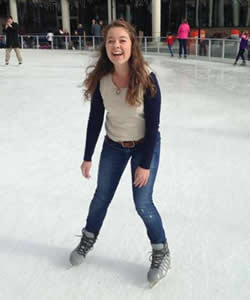For our February vacation, two friends and I decided to explore Morocco for its art, its rich history, and the fact that we would get our passports stamped; practicing French in a context outside of France was a bonus, and almost an afterthought. As we continued our research for the trip, however, French began to play a more integral role: we emailed in French to reserve hotels and bought the superior French travel guide to Maroc rather than the less detailed guide in English. Our host families were alternatively impressed and amused by our choice of location, as it’s a popular French vacation destination. Still, it was a shock to see the colonial implications in our French guidebook when it advised travelers to remember that many of the elderly men begging on the streets “fought with your grandfather in the war.”
When we arrived in Morocco by ferry from Spain, we quickly found ourselves in a situation outside of our control. We didn’t stand a chance “laying low” as the only tourists and the only women in sight in an uncomfortably deserted port. Looking around at the signs in French, we made the decision that we would be French rather than American for the remainder of our vacation, as it might give us a bit of the invisibility we needed. At the least, it was a decision that made us feel more secure in our agency at a time when we felt powerless. As it turned out, this change in self-identification opened many doors to discussion about what it means to be French in Morocco.
On the surface level, it would have been nearly impossible to navigate Morocco without knowledge of French (or Arabic), especially since we traveled first to the smaller city of Rabat and didn’t see written English until our arrival in the more tourist-filled city of Marrakesh. As such, we were able to communicate with locals and appreciate museums at a deeper level than most non-francophones. Our ability to speak French also helped us understand that our first taxi driver wasn’t taking us to an undisclosed location, but rather was bringing us to the bus station because trains weren’t running (a fact that the train’s website, also in French, failed to mention).
The benefits of being French were likewise reinforced every time we got a nod of approval after “correcting” others who identified us as American/Canadian/Belgian. According to one café owner in Rabat, we were able to get away with this identity swap because most Americans visiting the city spoke Arabic while the French visitors mostly spoke French. Given our relatively unique position as Americans being addressed as though we were French, we often found ourselves wondering how real French citizens would respond to certain situations, such as when a middle aged Moroccan gentleman welcomed us to “your second country.” While we felt uncomfortable with this perceived reference to colonialism and the oppressive systems of power of which we were representatives, one of our French host siblings smiled and replied, “Oh, the Moroccans are so friendly” when we relayed the story.
During other parts of our journey, code-switching between English and French yielded equally interesting results. While negotiating with a vendor at a market in Marrakesh, we introduced ourselves in French but told him that we were American. He exclaimed, “Land of Obama!” and told a few clever English puns. After I purchased a jacket typical of Berber culture, he assured me that I could wear it in America but that I shouldn’t wear it in France. “But,” he added, pointing at one of the traditional floor-length jackets, “If you wear that one in America, people will think you are family of Osama bin Laden.”
Throughout my time living in France, I’ve been privileged to learn more about French perspectives of America in the classroom at Sciences Po, through conversations with my host family, and by observing French interactions with American tourists. Stepping outside of my native perspective has created space both for critique and for newfound appreciation of American culture. While my experiences of Moroccan culture in themselves were incredible, part of what made them so profound was the fact that I was able to step outside of my new French identity to have a fuller grasp of what it means to be French, from a Moroccan perspective. Moving forward, I hope to continue to develop both “insider” and “outsider” perspectives of the United States and France.

